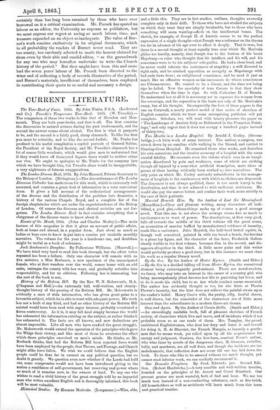His torical Studies. By Herman Merivale. (Longmans.) — Wise, able, and a little
thin. They are in fact studies, outlines, thoughts avowedly complete only in their drift. To those who have not studied the subjects
on which they treat they are simply invaluable, but to those who have something will seem wanting—flesh on the intellectual bones. The sketch, for example, of Joseph II. of Austria seems to us the perfect expression of a single thought—that Joseph was a reformer on the throne too far in advance of his age ever to affect it deeply. That is true, but there is a second thought at least equally true over which Mr. Merivale glides too hastily, namely, that Joseph was to the bottom of his heart Hapsburg—a ruler who thought that his intellect, and his will, and his conscience were to be his subjects' sole guides. He had a clear head, and he never could tolerate the resistances of stupidity ; a will directed to right ends, and he crashed opposition as savagely as Hapsburgs with bad ends have done ; an enlightened conscience, and he used it just as much like an offensive weapon as his successors do whose consciences are Mtramontane. He wanted to be a Cassel., and the time not being ripe he failed. Now the specialty of true Gassers is that they show themselves when the time is ripe. So with Catherine II. of Russia.
To understand her at all it is necessary not to separate the woman from the sovereign, and the separation is the basis not only of Mr. Merivale's essay, but of his thought. Incomparably the best of these papers is the one on Cornwall, a nearly perfect model of that series of sketches of English counties which we trust some enterprising publisher will yet complete. Scholars, too, will read with hearty pleasure the paper on " The Landscape of Ancient Italy as Delineated in the Pompeian Paint- ings," and only regret that it does not occupy a hundred pages instead of thirty-two,






























 Previous page
Previous page